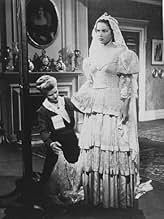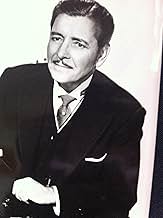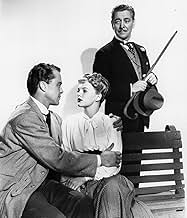अपनी भाषा में प्लॉट जोड़ेंGeorge and Catherine Apley, a Boston family, live a proper life in a social circle. However, Eleanor's love for Howard and John's union with Myrtle threatens their home.George and Catherine Apley, a Boston family, live a proper life in a social circle. However, Eleanor's love for Howard and John's union with Myrtle threatens their home.George and Catherine Apley, a Boston family, live a proper life in a social circle. However, Eleanor's love for Howard and John's union with Myrtle threatens their home.
- पुरस्कार
- कुल 3 जीत
Susan Blanchard
- Myrtle
- (काटे गए सीन)
John Ardell
- Trustee, Boston Waif Society
- (बिना क्रेडिट के)
Bonnie Bannon
- Undetermined Role
- (बिना क्रेडिट के)
David Bond
- Manager, Modiste Shop
- (बिना क्रेडिट के)
Clifford Brooke
- Charles
- (बिना क्रेडिट के)
Cordelia Campbell
- Child Skater
- (बिना क्रेडिट के)
Wally Dean
- Trustee, Boston Waif Society
- (बिना क्रेडिट के)
Diana Douglas
- Sarah
- (बिना क्रेडिट के)
फ़ीचर्ड समीक्षाएं
Ronald Coleman has a resemblance to Errol Flynn but far exceeds him in gentility,suavity and urbanity. His voice is mellifluous and unlike any male actor of his time, even to this day.His portrayal of George Apley is really entertaining and very realistic as anyone would know by reading novels written at the time about Boston "brahmins". The character he plays is the quintessential Boston blue blood. He could portray outrage in a controlled manner expected of the character of George Apley and also profound sadness at the discovery of the drawbacks of Bostonian upbringing.The humor in the whole story is also genteel and yet manages to make some in the audience laugh out loud. I did as I watched this gem of a movie. This movie is a treat to watch for those who view a movie in all its dimensions. His character eclipses all the rest in the story including that portrayed by the great Mildred Natwick.
Ronald Colman is "The Late George Apley" in this 1947 film based on a Philip Barry play, also starring Richard Ney, Peggy Cummins, Edna Best, Richard Haydn, Vanessa Brown, and Mildred Natwick. Apley is a stuffed shirt whose well-ordered family is suddenly not so well-ordered. His son (Richard Ney) is dating a girl from Worcester, which is seen by Apley as being someplace like the Black Hole of Calcutta, and his daughter (Cummins) loves a Yale man who lectures that Emerson was a radical. At first, George takes a firm stand, then relents at the behest of his understanding friend, who saw George give up the woman he loved 30 years earlier. When the Worcester girl's father actually rejects the Apley family, George rethinks his position. His daughter is sent to Europe to get away from her boyfriend, and his son is betrothed to his cousin (Brown).
Imagine going to Broadway shows in the '20s and '30s and attending one class-conscious play after another. Before the Depression, the sets were drawing rooms, the clothing was formal, everyone had British accents, and the plots had to do with the crossing of the classes. Frankly, I'm glad they finally intermingled.
Ronald Colman is marvelous as George, and one sees his confusion, pain, and remembrance of the past on his face. He's a very sympathetic character. Peggy Cummins is very pretty and Richard Ney is nice-looking. Vanessa Brown, as the dowdy cousin, gives a sweet performance, and her story arc is very satisfying.
If you're a fan of Ronald Colman, as I am, this is a good movie to see. Also, if you know Boston at all, you'll find hearing the street names interesting. Otherwise, it's a mildly interesting period piece that most people will find relating to difficult.
Imagine going to Broadway shows in the '20s and '30s and attending one class-conscious play after another. Before the Depression, the sets were drawing rooms, the clothing was formal, everyone had British accents, and the plots had to do with the crossing of the classes. Frankly, I'm glad they finally intermingled.
Ronald Colman is marvelous as George, and one sees his confusion, pain, and remembrance of the past on his face. He's a very sympathetic character. Peggy Cummins is very pretty and Richard Ney is nice-looking. Vanessa Brown, as the dowdy cousin, gives a sweet performance, and her story arc is very satisfying.
If you're a fan of Ronald Colman, as I am, this is a good movie to see. Also, if you know Boston at all, you'll find hearing the street names interesting. Otherwise, it's a mildly interesting period piece that most people will find relating to difficult.
I doubt this film could have been pulled off without Ronald Colman in the title role as a descendant of the prominent Apley family of Boston. His entire life is taken up with people of similar background, and he considers anything outside of the Back Bay of Boston to be a foreign country. The film is set in the years prior to WWI and horse drawn forms of transportation are still the norm. He believes in his own form of noblesse oblige, and is very satisfied with his ways of giving back to the community - Tuesday Night Club on Tuesday, Wednesday Night Club on Wednesday - need I say more?
In this rarefied museum piece of a life, George's children are about to turn everything upside down. His daughter is in love with a Harvard professor - so far so good - who is a Yale man! And the young man is teaching that Emerson is a rebel! Even worse, his son is in love with a young lady from Worcester whose father is president of a tool and die works! "A foreigner" as George himself says. To top things off a flashing electric sign advertising Grapenuts has been put within sight of his front door.
Like I said before, if the part of George was played by anybody else but the dapper and charming Colman, this guy would probably come across as insufferable. As it turns out, George really has a generous soul, a point that is driven home by Colman's portrayal, but his point of view is crowded with traditions that are centuries old whose origin he doesn't really understand himself, and to step away from them - or to see any member of his family step away from them - leads to a sense of discomfort that makes him feel that he perceives a wrong that must be righted.
I'll let you watch and see how this all works out, but it really is a delightful comedy of manners with real heart and delightful character actors in the supporting roles. Highly recommended.
In this rarefied museum piece of a life, George's children are about to turn everything upside down. His daughter is in love with a Harvard professor - so far so good - who is a Yale man! And the young man is teaching that Emerson is a rebel! Even worse, his son is in love with a young lady from Worcester whose father is president of a tool and die works! "A foreigner" as George himself says. To top things off a flashing electric sign advertising Grapenuts has been put within sight of his front door.
Like I said before, if the part of George was played by anybody else but the dapper and charming Colman, this guy would probably come across as insufferable. As it turns out, George really has a generous soul, a point that is driven home by Colman's portrayal, but his point of view is crowded with traditions that are centuries old whose origin he doesn't really understand himself, and to step away from them - or to see any member of his family step away from them - leads to a sense of discomfort that makes him feel that he perceives a wrong that must be righted.
I'll let you watch and see how this all works out, but it really is a delightful comedy of manners with real heart and delightful character actors in the supporting roles. Highly recommended.
The Late George Apley provides Ronald Colman in one of the best roles of his career as the proper Bostonian George Apley in those pre-World War I years. It's funny, but even then Boston had slipped away from the grasp of his kind. Those immigrants, starting with the ones from Ireland had been running the government there for about a generation when this play on which the film is based is set. But don't tell that to George, his kind if they don't outrightly rule, they do set the standards of proper conduct for America. When the Apleys gather for Thanksgiving, they're most mindful of the fact that some of their ancestors originated it.
But even Colman and his insular Boston world can't escape generational problems. Both his son Richard Ney and his daughter Peggy Cummins are having problems with their respective choices as life partners, especially Cummins who wants to marry a man who graduated from of all places, Yale.
Colman, maybe the most civilized leading man ever in screen history captures the essence of the decent, but somewhat fatuous George Apley. A man who thinks all the answers to life's problems can be found in a volume of Ralph Waldo Emerson. Even Emerson didn't think that.
The Late George Apley is based on a Pulitzer Prize winning novel by John P. Marquand who also collaborated with George S. Kaufman on the play. Their creation ran for 384 performances in the 1944-45 season and starred Leo G. Carroll and Janet Beecher on stage. Edna Best takes Beecher's role on screen as the patient wife of Colman.
Some really fine players populate the cast. Richard Haydn plays his usual fuss budget busybody of a cousin, always eager to help Colman maintain the high Apley standards. Mildred Natwick is Colman's even snootier sister and Percy Waram who was the only player to repeat his role from the stage plays her patient husband who talks to Colman like a Dutch uncle, not a brother-in-law.
The Late George Apley is a good American answer to those British comedy of manners even though a lot of this cast is of British origin. Would we had someone of the wit of George S. Kaufman today to write them and an actor with elegant prose of Ronald Colman to speak the lines.
But even Colman and his insular Boston world can't escape generational problems. Both his son Richard Ney and his daughter Peggy Cummins are having problems with their respective choices as life partners, especially Cummins who wants to marry a man who graduated from of all places, Yale.
Colman, maybe the most civilized leading man ever in screen history captures the essence of the decent, but somewhat fatuous George Apley. A man who thinks all the answers to life's problems can be found in a volume of Ralph Waldo Emerson. Even Emerson didn't think that.
The Late George Apley is based on a Pulitzer Prize winning novel by John P. Marquand who also collaborated with George S. Kaufman on the play. Their creation ran for 384 performances in the 1944-45 season and starred Leo G. Carroll and Janet Beecher on stage. Edna Best takes Beecher's role on screen as the patient wife of Colman.
Some really fine players populate the cast. Richard Haydn plays his usual fuss budget busybody of a cousin, always eager to help Colman maintain the high Apley standards. Mildred Natwick is Colman's even snootier sister and Percy Waram who was the only player to repeat his role from the stage plays her patient husband who talks to Colman like a Dutch uncle, not a brother-in-law.
The Late George Apley is a good American answer to those British comedy of manners even though a lot of this cast is of British origin. Would we had someone of the wit of George S. Kaufman today to write them and an actor with elegant prose of Ronald Colman to speak the lines.
THE LATE GEORGE APLEY is the sort of comedy of manners that audiences could appreciate in the '40s and '50s before more explosive entertainment took center stage. It's performed with great charm and skill by a talented cast--and especially by Ronald Colman (in the sort of stuffy role he was born to play) and by the charming British actress Peggy Cummins. Viewing her here, one can understand why Zanuck found her unsuitable to play Amber St. Claire in FOREVER AMBER--charming but immature in stature and looks.
The cast seems to be relishing their roles in this tale of Boston bluebloods striving to uphold the family's social status. Vanessa Brown and Richard Ney, unfortunately, are the least appealing aspects of the supporting cast in rather colorless roles. Richard Haydn shines, as he always does in these sort of things.
Only fans of Ronald Colman can truly appreciate this sort of period piece. It flows smoothly but with little ventilation seeping into the musty households and other interiors and seems more like a stage play soon to be seen on Masterpiece Theatre.
The cast seems to be relishing their roles in this tale of Boston bluebloods striving to uphold the family's social status. Vanessa Brown and Richard Ney, unfortunately, are the least appealing aspects of the supporting cast in rather colorless roles. Richard Haydn shines, as he always does in these sort of things.
Only fans of Ronald Colman can truly appreciate this sort of period piece. It flows smoothly but with little ventilation seeping into the musty households and other interiors and seems more like a stage play soon to be seen on Masterpiece Theatre.
क्या आपको पता है
- ट्रिवियाErnst Lubitsch directed additional scenes after Joseph L. Mankiewicz left the picture.
- भाव
Catherine Apley: She's from Worcester.
George Apley: [who is from Boston] From Worcester? A foreigner!
- कनेक्शनSpoofed in The Red Skelton Show: The Almost Late George Appleby (1961)
- साउंडट्रैकEvery Little Movement (Has a Meaning All Its Own)
(uncredited)
Music by Karl Hoschna
Lyrics by Otto A. Harbach
टॉप पसंद
रेटिंग देने के लिए साइन-इन करें और वैयक्तिकृत सुझावों के लिए वॉचलिस्ट करें
- How long is The Late George Apley?Alexa द्वारा संचालित
विवरण
- रिलीज़ की तारीख़
- कंट्री ऑफ़ ओरिजिन
- भाषा
- इस रूप में भी जाना जाता है
- Den charmerande mr Apley
- फ़िल्माने की जगहें
- Warner Brothers Burbank Studios - 4000 Warner Boulevard, बर्बैंक, कैलिफोर्निया, संयुक्त राज्य अमेरिका(New York City street scenes)
- उत्पादन कंपनी
- IMDbPro पर और कंपनी क्रेडिट देखें
- चलने की अवधि1 घंटा 33 मिनट
- रंग
- पक्ष अनुपात
- 1.37 : 1
इस पेज में योगदान दें
किसी बदलाव का सुझाव दें या अनुपलब्ध कॉन्टेंट जोड़ें


































